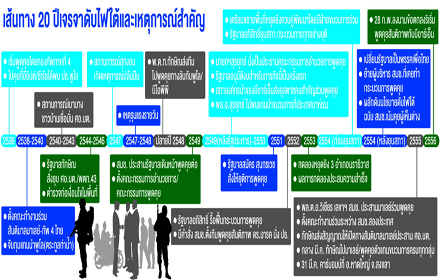History of peace talks to resolve southern unrest problem
The ongoing open peace talks between the Thai government and the Barisan Revolusi Nasional (BRN) separatist group is the first formal one but informal peace talks have taken place throughout the past 20 years albeit in secrecy.

Before the historic signing of the peace dialogue process deal in Kuala Lumpur on February 28 which paved the way for subsequent peace talks, there were 17 rounds of informal peace talks held behind closed doors in the past two decades.
The followings are some sketchy details of the previous peace talks.
In 1993, the Fourth Army Region sent officials to meet and talk with separatist groups with the extension of an olive branch for the separatists to give up their armed struggle and to join the national development programme. The peaceful approach led to informal meetings in Cairo and Damascus between Thai government representatives and Tungu Neeraw Kawtawneeraw, founder of the Pattani United Liberation Organisation. The meetings resulted to the Thai representatives endorsing the minutes of the meetings which was capitalized on by Pulo when it filed a report to the Organisation of Islamic Conference. An uproar ensued in the military and government circles prompting the Fourth Army Region to call off the peace talks with the Pulo.
In 1995, then prime minister Chuan Leekpai revived the peace talks at the urging of the Malaysian police chief during his visit of Thailand. A joint working committee comprising representatives of Malaysia Special Branch police and the Fourth Army Region was set up to explore the peace process. It was also agreed that Malaysia would arrest suspected separatists who were wanted in Thailand.
During 1995-1997,Malaysia’s cooperation led to the arrest of 4-5 Pulo core members taking refuge in Malaysia. However, public disclosure of Kuala Lumpur’s help by the Thai side caused an embarrassment for Malaysia. The peace process was eventually suspended.
During Thaksin regime in 2001-2002, the Southern Border Provinces Administration Centre and Task Force 33 were dissolved. The job to resolve the unrest problem and to protect territorial sovereignty was assigned to the army and the police. Alleged widespread abuses by the police especially against the local Malay Muslims culminated to the separatists’ raid of an armoury in Narathiwat on January 4, 2004. The incident symbolizes the start of an armed rebellion by a new generation of separatists.
In 2005, then prime minister Thaksin Shinawatra assigned a former army officer to hold talks with the Pulo and BIPP separatist groups in Switzerland. After two rounds of fruitless talks, the process was ditched.
The peace process was revived the following year at the suggestion of the National Security Council. Talks were held at two levels with then Deputy Prime Minister Chidchai Wannasathit overseeing the talks which eventually failed to make any headway.
After the 2006 coup which toppled the Thaiksin regime, then prime minister Surayud Chulanont led the peace talks process. The BRN’s leading council assigned a senior ustaz or religious teacher to hold talks with the Thai government.
Talks with the separatist groups was suspended by the government of prime minister Samak Sundaravech in 2008 only to be revived the following year by then prime minister Abhisit
Vejjajiva with Dr Marc Tamthai heading the government’s delegation. The talks led to a month-long ceasefire agreement in Bacho, Cho-I-rong and Yee Ngor districts of Narathiwat. Only eight violent incidents were reported in the three districts but the BRN claimed that the incidents were perpetrated by outsiders behond its control.
Ceasefire agreement was to be expanded to cover more districts but the plan was suspended abruptly after the Abhisit government dissolved the parliament and called a general election in mid-2011.
In 2012, fugitive former prime minister Thaksin Shinawatra was back to get involved in peace process. In March of the same year he visited Malaysia and held informal talks with 16 separatist leaders representing several separatist groups. Two huge car bombs exploded in Hat Yai and Yala on March 31. The bombings were suspected to be the work of separatist gangs which disagreed with the peace process.
On February 28, 2013, a peace dialogue agreement was signed in KL between the Thai government and the BRN which heralded the first formal peace talks between the two opposing sides.
------------------------------------------------------------------------------------------------------------------------
Caption : Timeline of peace talks
